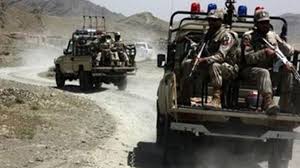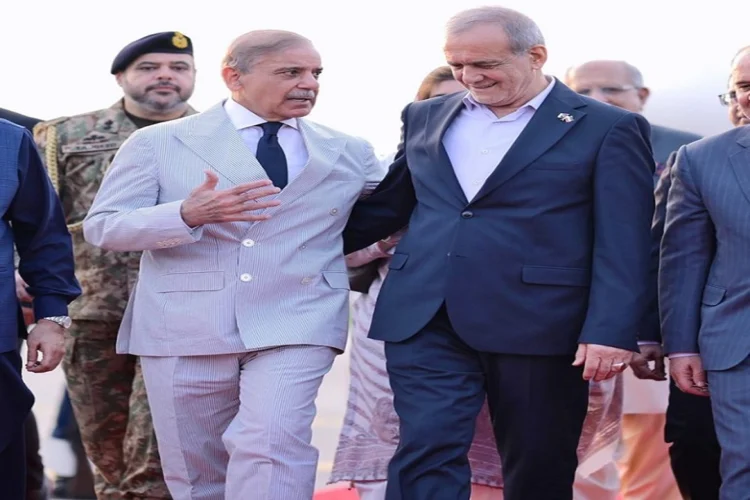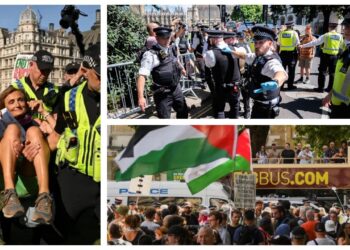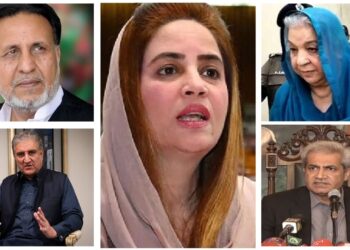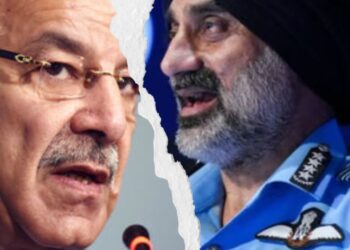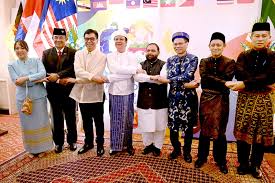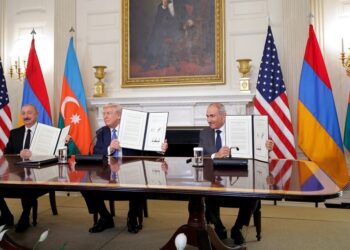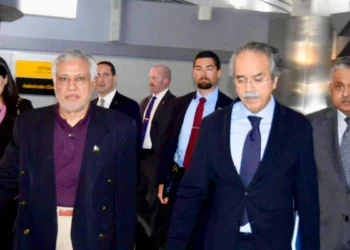ISLAMABAD (Web-Desk); In a pivotal move to reinforce regional solidarity and economic ties, President of the Islamic Republic of Iran, Dr. Masoud Pezeshkian, concluded his official visit to Pakistan with a reaffirmed commitment to deepen cooperation in trade, connectivity, security, and mutual geopolitical interests.
President Pezeshkian, on his first visit to Pakistan since assuming office, was received with full diplomatic honors. Prime Minister Muhammad Shehbaz Sharif welcomed him at the Prime Minister House, where a guard of honor and official reception were held. The visit, marked by ceremonial warmth and strategic dialogue, underscored the historical and cultural affinity between the two neighboring nations.
The two leaders held extensive one-on-one and delegation-level meetings, attended by senior Pakistani officials, including Deputy Prime Minister and Foreign Minister Senator Ishaq Dar, Chief of Army Staff Field Marshal Asim Munir, and members of the federal cabinet. From the Iranian side, high-level dignitaries from Tehran accompanied the president.
Key Trade Breakthroughs and Economic Vision
In a joint press interaction, Prime Minister Sharif emphasized that both nations are fully committed to enhancing bilateral trade volume from the current $3 billion to an ambitious target of $10 billion. “We have signed several transformative documents today that will lay the groundwork for this new economic era,” Sharif announced.
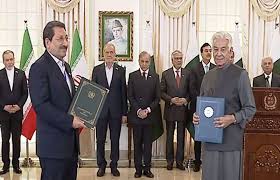
A total of 12 agreements and Memorandums of Understanding (MoUs) were exchanged, covering a range of sectors including plant protection, science and technology, maritime safety, IT cooperation, youth and cultural exchange, tourism, judicial assistance, and a joint commitment to finalize a Free Trade Agreement (FTA).
The leaders pledged to expedite the convening of the 22nd Joint Economic Commission and discussed innovative mechanisms like barter trade, export quota enhancement, and operationalization of border markets, especially through the Mirjaveh-Taftan gateway.
Regional Security and Shared Geopolitical Concerns
The visit came in the wake of a recent 12-day Israeli aggression against Iran. Prime Minister Sharif conveyed deep condolences for the loss of Iranian generals, scientists, and civilians. He lauded Iran’s “wisdom and courage” in responding to Israeli provocations and reiterated that Pakistan’s 240 million citizens stood united with Iran in condemnation of such hostilities.
“Pakistan supports Iran’s right to peaceful nuclear development under the UN Charter,” Sharif affirmed, renewing Islamabad’s longstanding policy of regional non-interference and sovereign equality.
On counter-terrorism, both countries emphasized zero tolerance for terrorism and agreed to strengthen border security and intelligence cooperation to prevent militant infiltration. “An attack on one is an attack on both,” the Prime Minister stated, reflecting the shared security challenges along their porous border.
Gaza and Kashmir: Calls for Muslim Solidarity
Both leaders denounced ongoing Israeli atrocities in Gaza and urged the international community to act decisively. “Newborns are being slaughtered, streets are soaked in blood, and food routes are blocked—how long will the world stay silent?” Sharif questioned, adding that mere verbal condemnations were insufficient and urging concrete actions from the Muslim world.
Drawing parallels between Palestine and Kashmir, he highlighted the ongoing human rights violations in Indian Illegally Occupied Jammu and Kashmir (IIOJK) and thanked Iran for consistently supporting the Kashmiri people’s right to self-determination.
President Pezeshkian echoed these sentiments, stating, “Unity among Muslim countries is no longer a choice, it’s a necessity.” He cited the poetry of Allama Iqbal to emphasize the historical and spiritual bond between the Iranian and Pakistani people. The Iranian leader also stressed that cooperation among Muslim nations was essential to resist the expansionist designs of the Zionist regime and to maintain regional stability.
Strengthening People-to-People Ties and Connectivity
President Pezeshkian highlighted his administration’s “neighborhood-first” foreign policy and said that Pakistan was not just a neighbor, but a brotherly nation. The two sides agreed to deepen cultural and educational exchange programs, develop sea, land, and air connectivity routes, and enhance tourism cooperation for 2025–2027.
“Today’s signed documents are not mere paper—they represent our political will to act,” he said, urging swift implementation of all agreements.
Ceremonial and Diplomatic Engagements
In addition to meetings at the Prime Minister House, President Pezeshkian was also received by President Asif Ali Zardari at Aiwan-e-Sadr, where the two exchanged greetings in a cordial environment reflecting the strong diplomatic rapport between the two nations. Deputy Prime Minister Ishaq Dar and other senior officials were also present at the occasion.
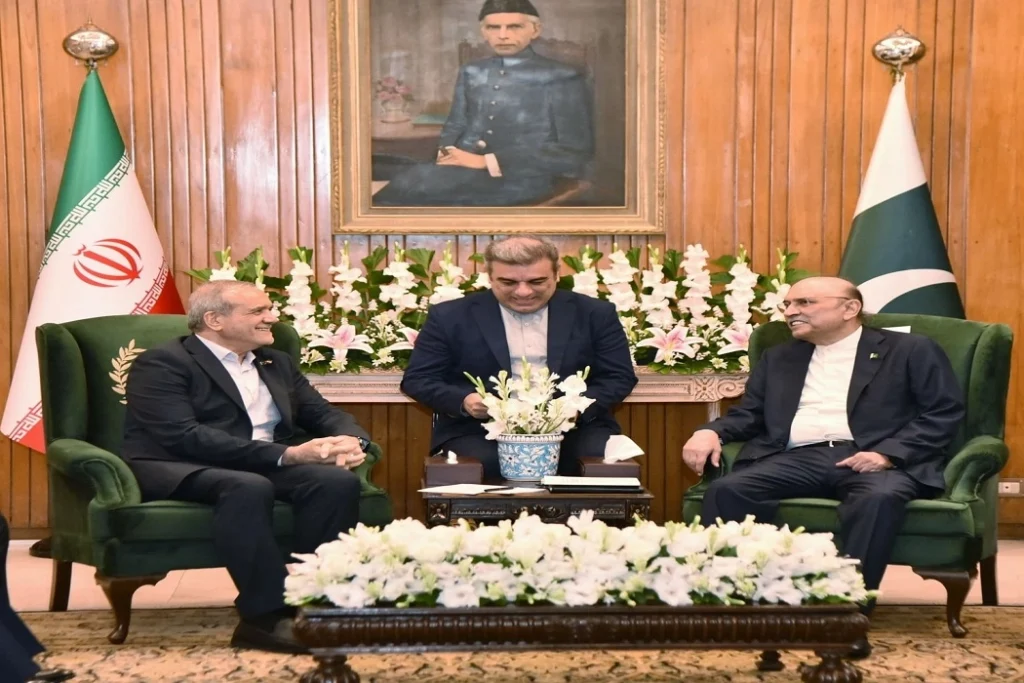
President Zardari warmly received his Iranian counterpart upon arrival at the Presidential Palace. During their meeting, both sides emphasized the need to strengthen economic, cultural, and people-to-people connections, while reiterating their shared desire to deepen mutual cooperation across various sectors.
The Pakistani president expressed gratitude to Iranian leadership for its principled stance and continued support for the oppressed people of Palestine and Indian-occupied Jammu and Kashmir. He strongly condemned Israel’s recent aggression and hailed the resilience of the Iranian people during the 12-day conflict, calling it a symbol of regional resistance.
President Zardari also acknowledged Iran’s solidarity with Pakistan during difficult times and appreciated Supreme Leader Ayatollah Ali Khamenei’s consistent support for Kashmir’s right to self-determination.
In response, Iranian President Dr. Pezeshkian thanked Pakistan for its support during the recent conflict and praised the country’s constructive role in de-escalating tensions and promoting peaceful conflict resolution.
He expressed optimism that his visit would further strengthen the historic ties between the two brotherly nations and open new avenues for enhanced trade, cultural exchange, and diplomatic cooperation.
A luncheon was hosted in honor of the Iranian delegation, followed by a joint press conference in which both leaders outlined a shared vision for regional peace, economic growth, and multilateral cooperation.
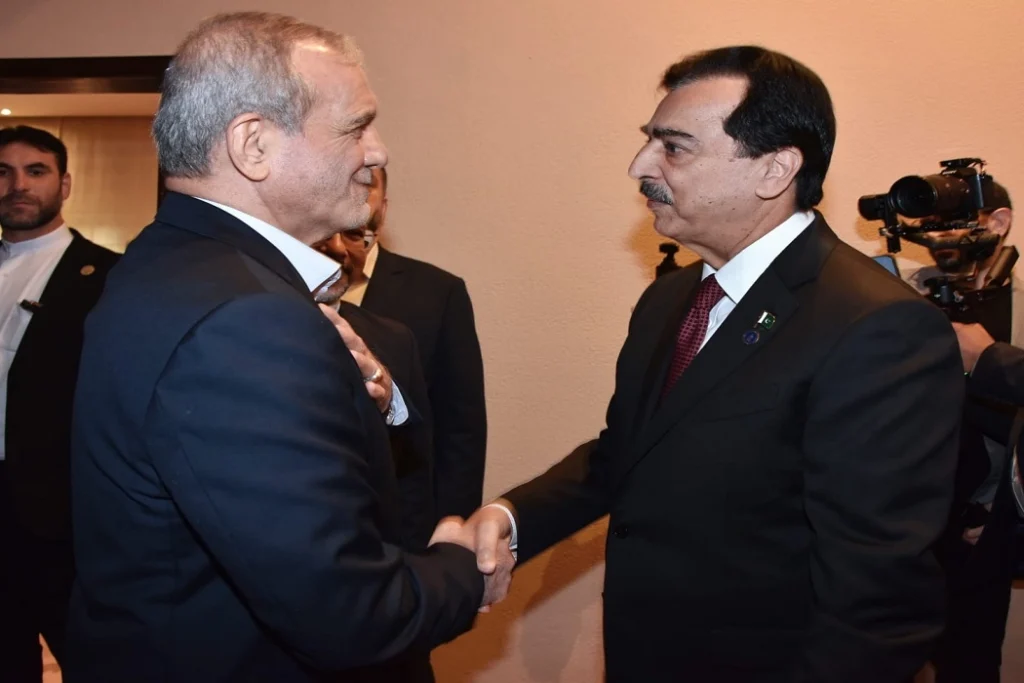
Chairman Senate Yousuf Raza Gillani met with Iranian President Dr. Masoud Pezeshkian in Islamabad, where both leaders agreed to strengthen bilateral relations and enhance regional cooperation. The meeting underscored shared commitment to peace, economic collaboration, and mutual respect for sovereignty, with a focus on deepening parliamentary and people-to-people ties.
The high-level meeting was attended by National Assembly Speaker Sardar Ayaz Sadiq, Senators Saleem Mandviwalla and Irfan Siddiqui, and MNA Naveed Qamar. Discussions revolved around strengthening fraternal ties, promoting peace and stability in the region, and boosting economic cooperation.
Chairman Senate Gillani lauded Iran’s bold stance against Israeli aggression, highlighting Pakistan’s consistent diplomatic efforts for regional peace and development. He reaffirmed Pakistan’s support for Iran’s right to self-defense and noted that both houses of Pakistan’s Parliament had passed resolutions condemning Israeli actions.
Gillani reiterated Pakistan’s support for Iran’s sovereignty and territorial integrity, and expressed a desire to further bolster parliamentary relations. He also thanked the Iranian president for the hospitality extended to Pakistani pilgrims visiting Iran.
President Pezeshkian appreciated Pakistan’s support and emphasized Iran’s readiness to cooperate in trade, economic development, and investment. He called for both nations to work together for regional peace and prosperity.
The two leaders agreed that their respective parliaments would play a vital role in fostering dialogue, cooperation, and lasting peace in the region, conveying a joint message rooted in partnership, brotherhood, and mutual understanding.
Looking Ahead
Both Iran and Pakistan have now embarked on a roadmap of actionable steps that reflect their mutual aspirations for a prosperous and secure region. The formalization of 12 key MoUs—ranging from meteorology and maritime safety to product certification and criminal judicial cooperation—signals an era of tangible progress.
In a time of shifting global alliances and persistent regional challenges, the visit of President Pezeshkian has renewed hopes for a deeper Iran-Pakistan partnership—anchored in shared values, common security concerns, and a bold economic vision.

